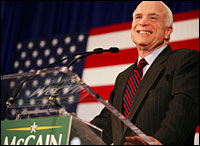
John McCain will give a big speech on energy policy this afternoon to a group of oil executives in Houston, Texas. According to his prepared remarks, his address will highlight the need to forge a path to energy independence, calling for expanded domestic oil and gas drilling as well as a move toward renewable energy sources and conservation.
“The next president must be willing to break with the energy policies not just of the current administration, but the administrations that preceded it, and lead a great national campaign to achieve energy security for America,” McCain will say. “I will set forth a strategy to free America once and for all from our strategic dependence on foreign oil.”
He will emphasize the urgent need to end reliance on oil from foreign sources: “Somehow the United States, in so many ways the most self-reliant of nations, has allowed and at times even encouraged this state of affairs. This was a troubling situation 35 years ago. It was an alarming situation 20 years ago. It is a dangerous situation today.”
McCain’s plan includes lifting a federal ban on offshore oil and gas drilling. “We have proven oil reserves of at least 21 billion barrels in the United States, but a broad federal moratorium stands in the way of energy exploration and production,” McCain will say. “I believe it is time for the federal government to lift these restrictions and to put our own reserves to use.”
This marks a notable change in position for McCain, who opposed ending the moratorium on offshore drilling during the 2000 election. At the time, he said it was “special interests in Washington” that wanted to expand offshore drilling. Now he says there should be incentives for states that allow exploration “in the form of tangible financial rewards, if the states decide to lift those moratoriums.”
McCain argues that this drilling can be done in “ways that are consistent with sensible standards of environmental protection.” And though he encourages increased drilling offshore, he stops short of advocating drilling in places like the Arctic National Wildlife Refuge, which many of his Republican colleagues have called for repeatedly. McCain has consistently opposed drilling in ANWR. “Quite rightly, I believe, we confer a special status on some areas of our country that are best left undisturbed,” McCain will say. “When America set aside the Arctic National Wildlife Refuge, we called it a ‘refuge’ for a reason.”
McCain’s offshore drilling call has already drawn a lot of heat since he tipped reporters off to it yesterday. Several green groups rushed out commentary. “If John McCain were looking for a way to prove he’s running for George Bush’s third term, he couldn’t do better than this. Maybe we should start calling him ‘Exxon John,'” said Friends of the Earth President Brent Blackwelder in a statement.
“If Senator McCain is serious about ending our addiction to oil and helping working families with inefficient cars, why has he voted against or missed every fuel-efficiency bill since 1990?” asked League of Conservation Voters President Gene Karpinski in a statement. “Drilling in protected areas offshore won’t solve our energy needs in the short term, and in the long term will increase the threat of global warming. We need to break our addiction to oil — not look for another fix.”
Other components of McCain’s energy plan are also sure to rile enviros, including a “gas-tax holiday,” expansion of oil refineries, and construction of new nuclear reactors.
But McCain also notes the need to change U.S. energy policy in order to curb global warming: “We now know that fossil-fuel emissions, by retaining heat within the atmosphere, threaten disastrous changes in climate. No challenge of energy is to be taken lightly, and least of all the need to avoid the consequences of global warming.”
He emphasizes the need for energy conservation, calling it “no longer just a moral luxury or a personal virtue” (a clear repudiation of Vice President Dick Cheney, who in 2001 said, “Conservation may be a sign of personal virtue, but it is not a sufficient basis for a sound, comprehensive energy policy”). In addition to conservation, McCain calls for a shift to “a sustainable mix of new and cleaner power sources” like wind, solar, and biofuels, as well as “clean-burning coal and nuclear energy.”
But McCain also takes a swipe at those — like his Democratic opponent, Barack Obama — who have emphasized the need to invest in renewable energies while opposing expansion of domestic drilling.
“With gasoline running at more than four bucks a gallon, many do not have the luxury of waiting on the far-off plans of futurists and politicians,” McCain will say.
The Obama campaign preempted McCain’s remarks with a statement Tuesday morning: “Much like his gas-tax gimmick that would leave consumers with pennies in savings, opening our coastlines to offshore drilling would take at least a decade to produce any oil at all, and the effect on gasoline prices would be negligible at best since America only has 3 percent of the world’s oil. It’s another example of short-term political posturing from Washington, not the long-term leadership we need to solve our dependence on oil.”

